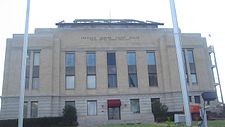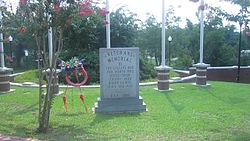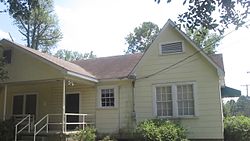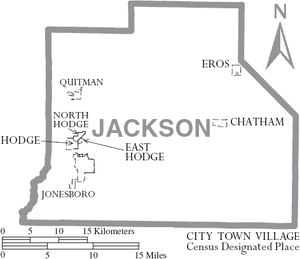- Jackson Parish, Louisiana
-
Jackson Parish, Louisiana The Jackson Parish Courthouse in Jonesboro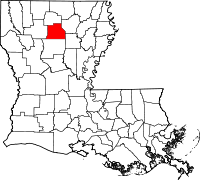
Location in the state of Louisiana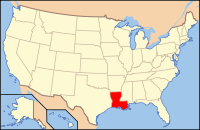
Louisiana's location in the U.S.Founded 1845 Named for U.S. President Andrew Jackson Seat Jonesboro Largest city Jonesboro Area
- Total
- Land
- Water
580 sq mi (1,503 km²)
570 sq mi (1,476 km²)
11 sq mi (27 km²), 1.82%Population
- (2010)
- Density
16,274
28/sq mi (10.8/km²)Time zone Central: UTC-6/-5 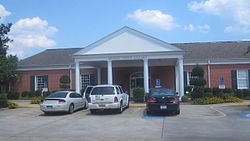 The Jackson Parish Library in Jonesboro
The Jackson Parish Library in Jonesboro
Jackson Parish (French: Paroisse de Jackson) is a parish located in the U.S. state of Louisiana. The parish was formed in 1845 from parts of Claiborne, Ouachita, and Union Parishes. In 2010, its population was 16,274. The parish seat is Jonesboro. Jackson Parish is part of the Ruston Micropolitan Statistical Area.
During the American Civil War Confederate General Richard Taylor sent five companies into Jackson and Winn parishes to arrest conscripts who failed to report for duty and to halt jayhawker groups in the area. General Edmund Kirby-Smith, moreover, directed that "all men who shirked their military duty be hunted down and forced into camp. Those who tried to escape the conscript hunters would be shot. The terrain of Louisiana with its many canebrakes, swamps, and hills in which to hide, made such an order difficult to carry out," explains the historian John D. Winters in The Civil War in Louisiana (1963).[1]
Contents
Geography
The parish has a total area of 580 square miles (1,502.2 km2), of which 570 square miles (1,476.3 km2) is land and 11 square miles (28.5 km2) (1.82%) is water.
Major highways
 U.S. Highway 167
U.S. Highway 167 Louisiana Highway 4
Louisiana Highway 4 Louisiana Highway 34
Louisiana Highway 34
Adjacent parishes
- Lincoln Parish (north)
- Ouachita Parish (northeast)
- Caldwell Parish (southeast)
- Winn Parish (south)
- Bienville Parish (west)

Lincoln Parish Ouachita Parish 
Bienville Parish 
 Jackson Parish, Louisiana
Jackson Parish, Louisiana 

Winn Parish Caldwell Parish Demographics
As of the census[2] of 2000, there were 15,397 people, 6,086 households, and 4,302 families residing in the parish. The population density was 27 people per square mile (10/km²). There were 7,338 housing units at an average density of 13 per square mile (5/km²). The racial makeup of the parish was 71.01% White, 27.87% Black or African American, 0.29% Native American, 0.21% Asian, 0.01% Pacific Islander, 0.24% from other races, and 0.37% from two or more races. 0.61% of the population were Hispanic or Latino of any race.
There were 6,086 households out of which 31.70% had children under the age of 18 living with them, 52.80% were married couples living together, 14.40% had a female householder with no husband present, and 29.30% were non-families. 27.00% of all households were made up of individuals and 13.50% had someone living alone who was 65 years of age or older. The average household size was 2.48 and the average family size was 3.01.
Census Pop. %± 1900 9,119 — 1910 13,818 51.5% 1920 14,486 4.8% 1930 13,808 −4.7% 1940 17,807 29.0% 1950 15,434 −13.3% 1960 15,828 2.6% 1970 15,963 0.9% 1980 17,321 8.5% 1990 15,705 −9.3% 2000 15,397 −2.0% 2010 16,274 5.7% Jackson Parish Census Data[3] In the parish the population was spread out with 25.30% under the age of 18, 9.30% from 18 to 24, 25.70% from 25 to 44, 23.60% from 45 to 64, and 16.20% who were 65 years of age or older. The median age was 38 years. For every 100 females there were 91.40 males. For every 100 females age 18 and over, there were 87.50 males.
The median income for a household in the parish was $28,352, and the median income for a family was $36,317. Males had a median income of $31,977 versus $19,992 for females. The per capita income for the parish was $15,354. About 16.00% of families and 19.80% of the population were below the poverty line, including 26.30% of those under age 18 and 15.80% of those age 65 or over.
Cities and towns
Education
Public schools in Jackson Parish are operated by the Jackson Parish School Board.
Notable persons
- Rodney Alexander, Republican U.S. representative
- H. Welborn Ayres, judge of the Second Judicial District Court in Jonesboro, 1942–1953
- David T. Caldwell, Second Judicial District Court judge, 1970–1982
- James Houston "Jimmie" Davis, former Democratic governor and a singer by profession.
- Randy Ewing, former Louisiana State Senate President and a 2003 Democratic gubernatorial contender.
- James R. Fannin, state representative from Jackson Parish since 2003
- E.L. "Bubba" Henry, former Democratic Speaker of the Louisiana House of Representatives, served in the House from District 13 from 1968–1980, the last eight of those years as Speaker
- Berry Hinton, native of Clay/Vernon communities; baseball coach at Louisiana Tech University from 1943 until 1967
- Arnold R. Kilpatrick (1920–2005), former president of Northwestern State University in Natchitoches
- Robert W. Mondy (1908–1997), historian at Louisiana Tech University who taught in Jackson Parish public schools in the early 1930s
- Robert Edwin Russ, the founder of Ruston, lived in Jackson Parish before moving to Lincoln Parish.
- James Monroe Smith (1888–1949), Jackson Parish native who served as president of Louisiana State University from 1930–1939; forced to resign in "Louisiana Hayride" scandals of 1939[4]
- Joseph Tabarlet (1900–1951), former mayor of Jonesboro[5]
- Neil Thomas (1892–1963), sheriff of Jackson Parish, 1928–1948; former state parole director under the Davis administration; originally a Jonesboro barber[6]
- George T. Walker (1913–2011), president of the University of Louisiana at Monroe from 1958 to 1976, was born and reared in the Wyatt Community of Jackson Parish.[7]
- William Stewart Walker (1914–1999), World War II United States Army officer; Republican congressional candidate, 1964; younger brother of George T. Walker.
Presidential elections
Jackson Parish was historically part of the Solid South with Al Smith receiving 100 percent of the vote in 1928.[8] It has trended more Republican since at least 1960. Bill Clinton and George W. Bush both carried the parish twice. In the 2008 U.S. presidential election John McCain outpolled Barack Obama by 30 percentage points.[9]
See also
- Historical romance author Jennifer Blake lives in Quitman.
- National Register of Historic Places listings in Jackson Parish, Louisiana
References
- ^ John D. Winters, The Civil War in Louisiana, Baton Rouge: Louisiana State University Press, 1963, ISBN 0-8071-0834-0, p. 306
- ^ "American FactFinder". United States Census Bureau. http://factfinder.census.gov. Retrieved 2008-01-31.
- ^ United States Census Bureau. "Louisiana Population of Counties by Decennial Census: 1900 to 1990". http://www.census.gov/population/cencounts/la190090.txt. Retrieved 2008-02-02.
- ^ "Smith, James Monroe". A Dictionary of Louisiana Biography (Louisiana Historical Association). http://www.lahistory.org/site36.php. Retrieved March 25, 2011.
- ^ "Tabarlet, Joseph Odell". Louisiana Historical Association, A Dictionary of Louisiana Biography (lahistory.org). http://www.lahistory.org/site37.php. Retrieved December 28, 2010.
- ^ You Are My Sunshine. http://books.google.com/books?id=vpX4c3bjwvYC&pg=PA180&lpg=PA180&dq=Neil+Thomas+and+You+ARe+My+Sunshine#v=onepage&q=&f=false. Retrieved October 11, 2009.
- ^ "George T. Walker". Monroe News Star. http://www.legacy.com/obituaries/thenewsstar/obituary.aspx?n=george-thomas-walker&pid=152392279. Retrieved July 6, 2011.
- ^ David Leip Election Atlas: 1928 statistics
- ^ The New York Times electoral map (Zoom in on Louisiana)
Municipalities and communities of Jackson Parish, Louisiana Towns Villages East Hodge | Hodge | North Hodge | Quitman
Categories:- Louisiana parishes
- Jackson Parish, Louisiana
- Ruston micropolitan area
Wikimedia Foundation. 2010.

